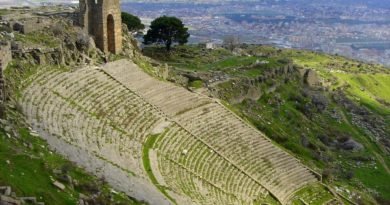Turkish Coffee: Its Past and Your Future
 Though you can find coffee beans around the world, from Sumatra to Guatemala, they originated in Ethiopia. The popular theory is that shepherds found their flocks eating the berries, making the sheep and goats chipper even at work on a Monday morning; the shepherds immediately saw the potential and chewed the red berries themselves becoming what must have been some incredibly sharp keepers of the herd.
Though you can find coffee beans around the world, from Sumatra to Guatemala, they originated in Ethiopia. The popular theory is that shepherds found their flocks eating the berries, making the sheep and goats chipper even at work on a Monday morning; the shepherds immediately saw the potential and chewed the red berries themselves becoming what must have been some incredibly sharp keepers of the herd.
The Arabs in Yemen picked up on coffee in the 6th century and for many years it was more or less their own jittery secret. For some Muslims, such as the dervishes, its consumption meant being able to stay up later for prayer; others criticized it as a stimulant. But the secret soon got out: two traders from Aleppo (in present-day Syria) brought the first coffee beans to Istanbul in 1555 and opened coffee houses. The drink, by then made with the roasted beans, not the berries, grew in popularity, and the coffee houses became social centers where men would gather to chat and play backgammon.
Perhaps the caffeine charge fostered a bit of paranoia, but the sultanate of the Ottoman Empire began to be a bit concerned about all these men meeting and discussing things such as politics. This could only lead to trouble, they thought; coffee gossip equals social unrest. In 1656, the Ottoman Grand Vizier Koprulu under Sultan Mehmed IV outlawed coffee drinking and shut down the shops.
The Europeans were also suspicious of this dark drink of the Muslims. But when a movement urged Pope Clement VIII to condemn it, he insisted he should first try it. Coffee fans can predict the result; in 1600 the drink received the blessing of the papacy and was no longer a “drink of the Devil.”
Coffee as Ritual
The term “coffee” is derived from the Arabic word “qahwa” by way of the Turkish word “kahve.” The word for breakfast in Turkish is kahvaltı, meaning “under or before coffee”. It is so much part of Turkish culture that at one time men would judge whether a woman would make a good wife based upon her ability to brew it.
Coffee has long had ceremony attached to its production and its consumption. The sultans of the Ottoman Empire appointed a royal coffee maker, a kahveciusta, and his work and service required as many as 40 assistants, far too many to fit in most kitchens.
Turkish coffee is made in a cezve, a metal pot that tapers toward the top. The foam is precious, and much like the foamed milk atop a cappuccino, it is an integral part of the experience. For this reason, coffee is prepared with a cezve that accommodates exactly the number of servings that are being prepared. If there is too much room in the cezve, the foam climbs the sides of the pot and sticks there when removed from the heat.
Turkish coffee beans were once ground with a mortar and pistil, and then with a small grinder. You can still purchase one at the Grand Bazaar or Egyptian Spice Market in Istanbul. The beans are ground to a fine powder, even finer than espresso. The next time you are grinding coffee beans at the grocery store you may note that the finest grind on the machine is set for Turkish coffee.
 Sugar is added to the coffee before it is even put over the heat. So when taking your order, a server will ask how you want it: şekerli (with sugar, az – a little, or çok – a lot), sada (plain), or orta (medium). I prefer mine orta and once, upon saying so to a waiter in Ankara, my friend Iffet leaned over to me and chuckled. “It does not matter what you say. They will all be orta.” Since the sugar goes in before the drinks are poured out, multiple measures would mean an extra cezve or two, i.e., more of an inconvenience.
Sugar is added to the coffee before it is even put over the heat. So when taking your order, a server will ask how you want it: şekerli (with sugar, az – a little, or çok – a lot), sada (plain), or orta (medium). I prefer mine orta and once, upon saying so to a waiter in Ankara, my friend Iffet leaned over to me and chuckled. “It does not matter what you say. They will all be orta.” Since the sugar goes in before the drinks are poured out, multiple measures would mean an extra cezve or two, i.e., more of an inconvenience.
The coffee and sugar are put on top of the water, and most Turks will tell you that there is no stirring. (Even if there is, this is the one time it might be done.) The cezve is placed over low heat and slowly the mixture is raised to a foaming boil. The die-hard traditionalists will then remove the cezve, possibly pouring out some of the foam into the waiting cups, and return the coffee to the heat once or twice more before finishing. The low heat is important because the coffee needs at least five minutes to brew. A perfect cup of Turkish coffee should be a homogeneous mixture, and the surface should be foamy and without coffee granules.
Unlike espresso, Turkish coffee is drunk slowly; the drinker sips so as not to disturb the settling grounds in the bottom of the cup. It is usually served with a glass of cold water to cleanse the palate to make way for the delightful taste. A cube of Turkish delight might rest on the saucer as well. Though all the coffee in the pot is poured into the cups, not all of the mixture is drunk: the grounds remain at the bottom.
A Fortune in Coffee
Tasseography, or fal in Turkish, is the fine art of telling one’s fortune from a cup—in this case, a coffee cup. With Turkish coffee, the grounds are what tell the story. To find your fortune you must put the saucer over the cup, give it a few gentle whirls, and then deftly flip it over and let it cool. Your host will then lift the cup to read the patterns left behind.
 As the grounds are nearly black and the porcelain cups almost always white, the shapes and patterns are clear; their meaning, however, is not. The trick is looking for the good omens in the white spaces, and the bad news in the grounds themselves. A good reader will see many things, from people and animals to symbols and inanimate objects. By combining these images, the fortuneteller weaves the story of your days to come. If the cup drips, it means tears. Whether those are tears of joy or sadness can only be determined by the person reading the cup.
As the grounds are nearly black and the porcelain cups almost always white, the shapes and patterns are clear; their meaning, however, is not. The trick is looking for the good omens in the white spaces, and the bad news in the grounds themselves. A good reader will see many things, from people and animals to symbols and inanimate objects. By combining these images, the fortuneteller weaves the story of your days to come. If the cup drips, it means tears. Whether those are tears of joy or sadness can only be determined by the person reading the cup.
I spent a year living in Turkey and often my friend Iffet would invite me to dinner and serve coffee at the end of the meal. Iffet, like many Turks I have known, could spend ten minutes narrating from my coffee cup. “In your future I see a tall thin woman—you see there?—and these are five long journeys. And an elephant.” I’m not sure if that was a good thing or not. I can’t always see the elephants or the thin women in my future; the only thing I ever see is coffee. And even I could have predicted that.
And if you want to learn more about other superstitions in Turkish culture, read more about the evil eye in Turkey.
Check out my blog to see how they do coffee in Tokyo!








 ORDER YOUR COPY TODAY!
ORDER YOUR COPY TODAY! ORDER YOUR COPY TODAY!
ORDER YOUR COPY TODAY!
I have never understood how people can drink Turkish coffee. The taste just does not appeal to me at all. Fun to see what they come out with in the fortune telling though!
I love the stuff, though I’m not too keen on it when the grounds don’t quite settle out. And it must be medium-sweet, orta. Haven’t really met a coffee I didn’t like other than “diner coffee” which Italians refer to as “broth.” Do you like the tea at least?
I love this post! I drink this coffee all the time, and occasionally someone reads my cup, but I never knew the background. Thanks for the history lesson!
Thanks for your comment, Ellen! I make it home from time to time, but when I stare into the cup, all I see is mud. Gees, I hope that’s not a bad omen!
Pingback: Cappadocia, Turkey: In the Land of the Fairy Chimneys
I think I’ll have to be living in Turkey in order to acquire a taste for the coffee! Good to know how to properly sip the coffee though 🙂
The experience sucks you in, and then after you’ve done it a couple times, you come to expect it and even acquire a taste for it maybe. 🙂
good stuff. I lived and taught in Istanbul for 7 years before retiring to our village home in Kaş on the Mediterranean coast of Turkey. In your next travel to Turkey, come visit us and we will sip raki and drink Turkish coffee, the perfect finish to a great dinner…
Here is what Mark Twain had to say about Turkish coffee: in what is allegedly the first travelogue Innocents Abroad:
“Then he brought the world-renowned Turkish coffee that poets have sung so rapturously for many generations, and I seized upon it as the last hope that was left of my old dreams of Eastern luxury. It was another fraud. Of all the unchristian beverages that ever passed my lips, Turkish coffee is the worst. The cup is small, it is smeared with grounds; the coffee is black, thick, unsavory of smell, and execrable in taste. The bottom of the cup has a muddy sediment in it half an inch deep. This goes down your throat, and portions of it lodge by the way, and produce a tickling aggravation that keeps you barking and coughing for an hour.“
Thanks for the comment, Johnny! I have never been to Kaş but would love to go someday. I’ll look you up for that rakı and coffee. As for Mark Twain’s IA being the first travelogue, I’m not so sure (great as it is). Maybe in English? Some of those Ancient Greek writers surely are contenders. But as for the Turks, look up Evliya Çelebi, a 17th-century Ottoman writer who traveled the entire empire writing about his experiences as he went. I’ve read excerpts in translation from a prof in Chicago. Pretty cool!
I’m just curious, if you were in Turkey? What language should you know?
Turkish! 🙂 But especially in tourist areas there is generally enough English to get along.
Hi Kevin. Just got back from a wonderful tour of Turkey and was happy to discover your blog while I was looking for more information. I loved just about everything about this country, including the coffee. It tasted kind of musty to me, which I thought was interesting. I wonder if that was because of the water being so mineral-rich or if the coffee beans themselves are treated differently. Any ideas about that?
Loving your pictures and all of the great travel information.
Hi Judith, Glad you enjoyed Turkey. I love the place. I’m not sure musty is the word I’m looking for, but I know what you mean. It just seems like something has been done to it. However, as far as I know it is merely Arabica coffee beans, roasted just shy of French roast, and ground rather finely. The grind affects the taste of course, but the difference sure is surprising and makes me wonder as well if there is something we don’t know. In parts of Arabia they add cardamon, but that’s not what we’re tasting. (big shrug) I just know I love it.
I love enjoying a cup of Turkish Coffee first thing in the morning while sitting by a harbour at a local Belediyesi Cafe. I wrote about the experience at a guest article over at Travel Sign Posts, and I also wrote a poem about Turkish Coffee being my cup of tea. So I guess you could say that Turkish Coffee is a little bit inspiring. I love that it takes a while to prepare, so that you can sit and watch the world go by for a little bit longer. The coffee is just an excuse to enjoy the moment.
I like morning rituals and coffee in a variety of preparations counts!
Pingback: A Day Lost in Istanbul
Pingback: The Best Turkish Coffee in Istanbul
Pingback: Thirsty Thursday: How Do You Take Your Coffee? - Travel Freak
Pingback: Photo Gallery: Cappadocia, Turkey
Pingback: 25 Interesting Facts About Marriage and Divorce | KickassFacts.com
hi . what is the meaning of lioness in fal?
Hi, I am not an expert in this, but I believe the lioness means either a person born under the astrological sign of Leo or it represents a strong family.
Pingback: 25 Interesting Facts About Middle Eastern Countries – Part 5 of 5 | KickassFacts.com
Hey Natalie, I have the same thoughts about Italian espresso. As a Turk, far the best coffee is surely Turkish coffee. I think you should try it with milk instead of water.
Pingback: Fact of the Day - Interesting Facts Of The Day - Daily Facts | KickassFacts.com